The Prime Minister of the Republic of Slovenia, Janez Janša, and his ministers continued their visit to Dolenjska and Bela Krajina with this morning's working meeting in Šmarješke Toplice. The cabinet checked which promises given in January 2006, when the government team first visited this region, have been kept.
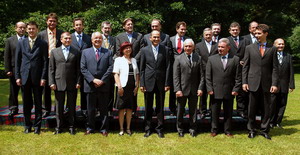
(Photo: Nebojša Tejić/Salomon 2000)
They also discussed new development opportunities that have arisen since then, and expressed contentment with the progress made by the region, which is confirmed by statistical data. At the moment, the region ranks fourth in Slovenia in terms of GDP per capita; the number of companies has increased substantially, boosting employment.
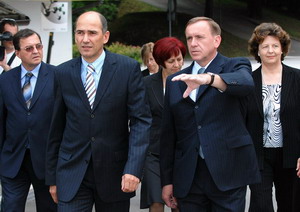
(Photo: Nebojša Tejić/Salomon 2000)
This year's visit included some 70 different events and meetings in fourteen municipalities. At noon the PM travelled to Novo mesto to attend the opening of the Sinteza IV unit at Krka pharmaceutical company. He welcomed the fact that EU members had stated in the Lisbon Strategy that the European economy would become more competitive and knowledge-based. Today's opening of the Sinteza IV unit, one of the biggest and most demanding investments ever undertaken by the company, is taking Slovenia closer to attaining this goal. On behalf of the Slovenian government the PM congratulated all former and present Krka employees, commending the development of the company and thanking everyone for their sense of social responsibility in the local environment. He mentioned the high economic growth of 7.2 per cent that Slovenia experienced in the first months of 2007, and stressed the efforts of the government to establish an environment even more conducive to entrepreneurship. With regard to this, the tax legislation has been simplified, enabling companies to more easily employ highly educated staff. Before long an amended Employment Relations Act will be discussed and passed, which will facilitate a more flexible labour market, but not at the expense of social security. "Slovenia has reached a level of development where it can do this," said the PM with optimism. He then took a tour of the new unit and met Krka's management to discuss the third development axis, the road connection between Ljubljana and Novo mesto, and the shortage of highly educated staff.
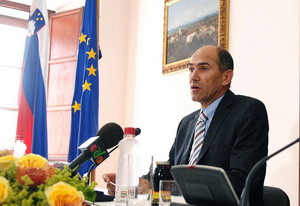
(Photo: Nebojša Tejić/Salomon 2000)
At a press conference in Metlika, Mr Janša summed up his impressions eighteen months after the cabinet's first visit to the region. He said that the region had developed, which is evident from statistics. In terms of GDP per capita, the region ranks fourth in Slovenia, while in terms of the level of development, it has attained 91 per cent of the Slovenian average. The PM said that the increase in the number of companies – 10% in Dolenjska and 11% rise in Bela Krajina – was particularly encouraging, since it showed the exceptional flexibility of the region's economy. Between 2005 and 2006, companies in Dolenjska and Bela Krajina had received a total of over €28 million of individual government aid, coupled with over €1 million from funds earmarked for encouraging foreign direct investment.
Exceptional economic growth during this period has played a major role in reducing the percentage of unemployed to twenty-six. As in most other Slovenian regions, the government has noticed that in Dolenjska and Bela Krajina there is a labour shortage, which according to the PM is one of the key development problems. Mr Janša drew attention to two projects: the construction of an economic growth centre for South-Eastern Slovenia and the modernisation of the national road network on priority development axes, which are included in the Resolution on National Development Projects for the Period 2007-2023, and will provide for more rapid and balanced development in the region.
Prime Minister Janša also stressed that the current EU Financial Perspective envisages co-financing key regional projects in Dolenjska to the amount of €50 million. This translates into an average of €365 per capita and is substantially more that the Slovenian average of €290 per capita. Mr Janša also appealed to all key individuals and institutions responsible for the development of the region to draw up quality programmes for as many projects as possible, as there is no shortage of funds. The new Act on Local Finances creates new opportunities, allocating more funds to local authorities in Dolenjska and Bela Krajina. Additional funds will also be available with the introduction of provinces. According to the PM, Dolenjska and Bela Krajina will definitely have the status of a province; however, its precise geographical borders will be discussed after the date for submitting opinions on the government's proposals.
With regard to constructing a southern extension of the Karavanke-Obrežje motorway, the PM explained that since the government's last visit to the region the relevant procedures have sped up, so the construction should be completed by the end of 2008. Progress has also been made in determining the precise routes of the southern extension of the third development axis. In accordance with the timeline presented to ministers at this morning's meeting, the final decision on routes within the third development axis should be reached by the end of the year.
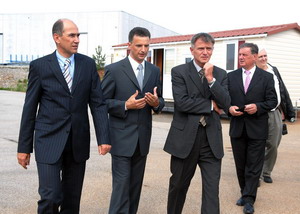
(Photo: Nebojša Tejić/Salomon 2000)
In the afternoon, the PM visited the Tris Business Park, constructed on the site of the former Kanižarica coal mine in Črnomelj. The park houses 25 companies employing 250 people, but there are plans to increase jobs in the next five years to 450. Representatives of both local authorities and the district presented the PM with a development vision, emphasising the role of establishing a business incubator and a technology park. Mr Janša welcomed their efforts, saying that Tris Business Park was one of the vital integrators of development in the region. He added that the university centre to be built there would also have an important integrating role with regard to human resources. According to the PM, the enlargement of Tris is important for the development of this part of the region, and is in line with the national project of constructing an economic growth centre for South-Eastern Slovenia as per the Resolution on National Development Projects for the Period 2007-2023.
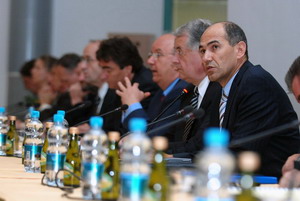
(Photo: Nebojša Tejić/Salomon 2000)
In the late afternoon in Novo mesto, the PM met mayors, business representatives and others involved in regional development. He presented the participants with the government's conclusions on the visit, stressing that the focus had been primarily on the region's development opportunities. Other important topics discussed were the Roma issue, infrastructure and employment opportunities.
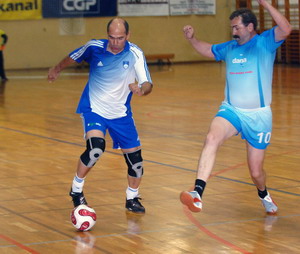
(Photo: Nebojša Tejić/Salomon 2000)
To conclude their two-day visit to Dolenjska and Bela Krajina, the government team took on a team of local business representatives and politicians in a charity football match in Trebnje, winning the game by 3:2.
Already the previous day in Novo mesto the Prime Minister of the Republic of Slovenia, Janez Janša together with some ministers visited the company Revoz. He also met with Msgr. Andrej Glavan, Bishop Ordinary of the diocese of Novo mesto. (more about the event)